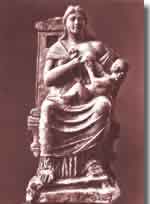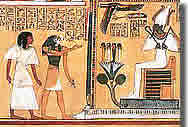 |
|||||||||||||||||||||||||||||||||||||||||||||||||||||||||||||||||||||||||||||||||||
The
dying, resurrected saviors |
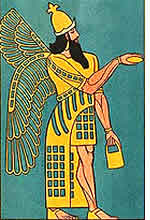 |
The men of latter times accepted
this..., not only calling them the births and deaths of the gods, but
even believing that they are so. Was Jesus new? Was Jesus unique? Lets talk about the Pagan godmen.
|
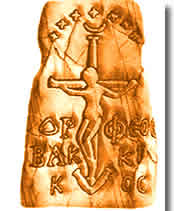 |
|||||||
|
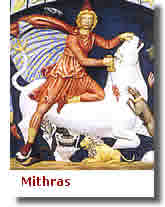 |
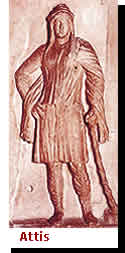 |
 |
||||||
|
Was Jesus a xerox
copy of one particular Pagan God? Was He Mithras renamed? Or Dionysus?
The answer is No.
Jesus was new -- in the same way the first Honda Accord was a new car and the first Mountain Dew was a new soda pop. But the Accord wasn't the first car, and Dew wasn't the first soda. They were "new" versions of old ideas. So was Jesus. Jesus was the Son of God who suffered, died, and was reborn. But He wasn't the first Son of God who suffered, died, and was reborn. He brought salvation; but He wasn't the God first to do that either. His mom was a virgin; He wasn't the first God there either. It's the same with miracles, disciples, ascending to heaven -- the list goes on and on. Believing scholars like to bring up differences between Jesus and the earlier Pagan godmen. Mithras was born of a rock, not a virgin, so Jesus can't be Mithras. Attis died under a pine tree, not on a cross, so Jesus can't be Attis. Believing scholars are right, Jesus wasn't Mithras, and He wasn't Attis. Jesus was a "new" God, the same way the first Honda Accord was a new car. He was a "new" version of God, built from old ideas. POCM's Pagan Christs section lists a few of the Pagan godmen. They all predated Jesus. You'll see they were each different from Jesus, but Jesus was certainly a member of the godmen's club. |
The dying, resurrected godmen. We don't know exactly when the myths of the resurrected godmen began -- they date back thousands of years, basically fading into prehistory. We do know the myths began in the eastern Mediterranean (aka The Levant, the Middle East, Mesopotamia, Persia-Assyria-Syria), where farming cultures developed religions that celebrated the yearly return of crop fertility. You probably won't be surprised to hear Mother Earth religions had Gods who personified the cycle-of-nature by dying in the autumn and being reborn in the spring. |
You'll be happy to know we're not talking about hand waving archeologist guesswork here. Plutarch [he lived from about AD 45 to 120], gives details of religions already ancient in his time >>
|
In Athens the women fast...and the Boeotians...name that festival the Festival of Sorrow, since Demeter is in sorrow because of her daughter's decent into Pluto's realm. This month, in the season of the Pleiades, is the month of seeding.... The Phrygians, believing that the god is asleep in the winter and awake in the summer, sing lullabies for him in the winter and in the summer chants to arouse him, after the manner of Bacchic [ aka Dionysus'] worshipers. The Paphlagonians assert that in the winter he is bound fast and imprisoned, but that in the spring he bestirs himself and sets himself free again. [Plutarch, Isis and Osiris, 378] |
As you see, the myths' details differed. Can we be sure these pre-Christian people really believed their gods died and came back to life? Plutarch says yes >> |
The men of latter times accepted this..., not only calling them the births and deaths of the gods, but even believing that they are so. [Plutarch, Isis and Osiris, 379] |
| In fact, in their worship at these festivals says Plutarch >> | "...they did many things like persons at a funeral in mourning for their dead." [Plutarch, Isis and Osiris, 379] |
The ancient Greeks and Romans inherited and adapted Gods from the archaic Middle East, carrying their myths past the cycle-of-nature stage. Their names? Adonis, Dionysus, Cybele and Attis, Isis and Osiris. And others. This Pagan Christs section will help you discover their myths and theologies. You should understand, there's a lot of stuff about the godmen we don't know -- after Constantine's conversion in 312 AD, pagan religions were suppressed, their temples destroyed or converted, their priests murdered, their sacred texts burned. We do know the names of their Gods, and some of their rituals. And we can trace their ideas to Greece and Rome -- and on to the church in your neighborhood this weekend. Amazing, huh? |
